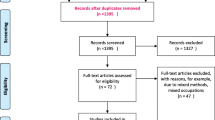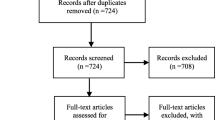Abstract
The changing nature of healthcare education and delivery is such that clinicians will increasingly find themselves practicing in contexts that are physically and/or conceptually different from the settings in which they were trained, a practice that conflicts on some level with socio-cultural theories of learning that emphasize learning in context. Our objective was therefore to explore learning in ‘professionally distant’ contexts. Using paramedic education, where portions of training occur in hospital settings despite preparing students for out-of-hospital work, fifty-three informants (11 current students, 13 recent graduates, 16 paramedic program faculty and 13 program coordinators/directors) took part in five semi-structured focus groups. Participants reflected on the value and role of hospital placements in paramedic student development. All sessions were audio recorded, transcribed verbatim and analyzed using inductive thematic analysis. In this context six educational advantages and two challenges were identified when using professionally distant learning environments. Learning could still be associated with features such as (a) engagement through “authenticity”, (b) technical skill development, (c) interpersonal skill development, (d) psychological resilience, (e) healthcare system knowledge and (f) scaffolding. Variability in learning and misalignment with learning goals were identified as potential threats. Learning environments that are professionally distant from eventual practice settings may prove meaningful by providing learners with foundational and preparatory learning experiences for competencies that may be transferrable. This suggests that where learning occurs may be less important than how the experience contributes to the learner’s development and the meaning or value he/she derives from it.
Similar content being viewed by others
References
Barnett, S. M., & Ceci, S. J. (2002). When and where do we apply what we learn? A taxonomy for far transfer. Psychological Bulletin, 128(4), 612–637.
Bigham, B. L., Kennedy, S. M., Drennan, I., & Morrison, L. J. (2013). Expanding paramedic scope of practice in the community: A systematic review of the literature. Prehospital Emergency Care, 17(3), 361–372. doi:10.3109/10903127.2013.792890.
Bunniss, S., & Kelly, D. R. (2010). Research paradigms in medical education research. Medical Education, 44(4), 358–366. doi:10.1111/j.1365-2923.2009.03611.x.
Charmaz, K. (2008). Constructionism and the grounded theory method. In J. A. Holstein & J. F. Gubrium (Eds.), Handbook of constructionist research (pp. 397–412). New York: The Guilford Press.
Chou, C. L., Teherani, A., Masters, D. E., Vener, M., Wamsley, M., & Poncelet, A. (2014). Workplace learning through peer groups in medical school clerkships. Medical Education, 19, 25809. doi:10.3402/meo.v19.25809.
Cook, D. A., Hatala, R., Brydges, R., Zendejas, B., Szostek, J. H., Wang, A. T., & Hamstra, S. J. (2011). Technology-enhanced simulation for health professions education: A systematic review and meta-analysis. Journal of the American Medical Association, 306(9), 978–998.
Courtney-Pratt, H., FitzGerald, M., Ford, K., Marsden, K., & Marlow, A. (2012). Quality clinical placements for undergraduate nursing students: A cross-sectional survey of undergraduates and supervising nurses. Journal of Advanced Nursing, 68(6), 1380–1390. doi:10.1111/j.1365-2648.2011.05851.x.
Coveney, A. P., Switzer, T., Corrigan, M. A., & Redmond, H. P. (2013). Context dependent memory in two learning environments: The tutorial room and the operating theatre. BMC Medical Education, 13, 118.
Durning, S., & Artino, A. R. (2011). Situativity theory: A perspective on how participants and the environment can interact: AMEE Guide no. 52. Medical Teacher, 33(3), 188–199. doi:10.3109/0142159X.2011.550965.
Durning, S. J., Artino, A. R., Boulet, J. R., Dorrance, K., van der Vleuten, C., & Schuwirth, L. (2012a). The impact of selected contextual factors on experts’ clinical reasoning performance (does context impact clinical reasoning performance in experts?). Advances in Health Science Education Theory and Practice, 17(1), 65–79. doi:10.1007/s10459-011-9294-3.
Durning, S. J., Dong, T., Artino, A. R., LaRochelle, J., Pangaro, L. N., Van Der Vleuten, C. P. M., & Schuwirth, L. (2012b). Instructional authenticity and clinical reasoning in undergraduate medical education: A 2-year, prospective randomized trial. Military Medicine, 177(9), 38–43.
Ellaway, R. H., Pusic, M., Yavner, S., & Kalet, A. L. (2014). Context matters: Emergent variability in an effectiveness trial of online teaching modules. Medical Education, 48(4), 386–396. doi:10.1111/medu.12389.
Ericsson, K. A. (2008). Deliberate practice and acquisition of expert performance: A general overview. Academic Emergency Medicine, 15(11), 988–994. doi:10.1111/j.1553-2712.2008.00227.x.
Godden, D. R., & Baddeley, A. D. (1975). Context-dependent memory in two natural environments: On land and underwater. British Journal of Psychology, 66(3), 325–331.
Haji, F., Cheung, J., deRibaupierre, S., Dubrowski, A., Regehr, G., & Woods, N. (2015). Performance and cognitive load among novices training on simple vs. complex simulation scenarios during procedural skills training: A prospective randomized study. Simulation in Healthcare, 9(6), 414.
Hall, W. A. (2006). Developing clinical placements in times of scarcity. Nurse Education and Practice, 6(6), 319–325. doi:10.1016/j.nepr.2006.07.005.
Hayden, J. K., Smiley, R. A., Alexander, M., Kardong-Edgren, S., & Jeffries, P. R. (2014). The NCBSN National simulation study: A longitudinal, randomized, controlled study replacing clinical hours with simulation in prelicensure nursing education. Journal of Nursing Regulation, 5(4), S2–S64.
Kaufman, D., & Mann, K. V. (2010). Teaching and learning in medical education: How theory can inform practice. In T. Swanwick (Ed.), Understanding medical education: Evidence, theory and practice (pp. 16–18). West Sussex: Wiley-Blackwell.
Kitzinger, J. (1994). The methodology of focus groups: The importance of interaction between research participants. Sociology of Health & Illness, 16(1), 103–121.
Koens, F., Cate, O. T. T., & Custers, E. J. (2003). Context-dependent memory in a meaningful environment for medical education: In the classroom and at the bedside. Advances in Health Science Education Theory & Practice, 8, 155–165.
Koens, F., Mann, K. V., Custers, E. J., & Ten Cate, O. T. (2005). Analysing the concept of context in medical education. Medical Education, 39(12), 1243–1249. doi:10.1111/j.1365-2929.2005.02338.x.
Larue, C., Pepin, J., & Allard, É. (2015). Simulation in preparation or substitution for clinical placement: A systematic review of the literature. Journal of Nursing Education and Practice,. doi:10.5430/jnep.v5n9p132.
Maley, M., Worley, P., & Dent, J. (2009). Using rural and remote settings in the undergraduate medical curriculum: AMEE Guide No. 47. Medical Teacher, 31(11), 969–983. doi:10.3109/01421590903111234.
Mann, K. (2011). Theoretical perspectives in medical education: Past experience and future possibilities. Medical Education, 45(1), 60–68. doi:10.1111/j.1365-2923.2010.03757.x.
Marshall, M. N. (1996). Sampling for qualitative research. Family Practice, 13(6), 522–525.
McGaghie, W. C., Issenberg, S. B., Petrusa, E. R., & Scalese, R. J. (2010). A critical review of simulation-based medical education research: 2003–2009. Medical Education, 44(1), 50–63. doi:10.1111/j.1365-2923.2009.03547.x.
McKenna, K. D., Carhart, E., Bercher, D., Spain, A., Todaro, J., & Freel, J. (2015). Simulation use in paramedic education research (SUPER): A descriptive study. Prehospital Emergency Care,. doi:10.3109/10903127.2014.995845.
McLafferty, I. (2004). Focus group interviews as a data collecting strategy. Journal of Advanced Nursing, 48(2), 187–194.
Myhre, D. L., Adamiak, P. J., & Pedersen, J. S. (2015). Specialty resident perceptions of the impact of a distributed education model on practice location intentions. Medical Teacher, 37(9), 856–861. doi:10.3109/0142159X.2014.993952.
Nielsen, D. G., Gotzsche, O., Sonne, O., Eika, B. (2012). The relationship between immediate relevant basic science knowledge and clinical knowledge: Physiology knowledge and transthoracic echocardiography image interpretation. Advances in Health Science Education Theory and Practice, 17(4), 501–513. doi:10.1007/s10459-011-9327-y.
Norman, G. (2012). The basic role of basic science. Advances in Health Science Education Theory and Practice, 17(4), 453–456. doi:10.1007/s10459-012-9394-8.
Norman, G. (2014). Context, curriculum and competence. Advances in Health Science Education Theory and Practice, 19(5), 625–628. doi:10.1007/s10459-014-9565-x.
Parker, A., Gellatly, A., & Waterman, M. (1999). The effect of environmental context manipulation on memory: Dissociation between perceptual and conceptual implicit tests. European Journal of Cognitive Psychology, 11(4), 555–570.
Pimmer, C., Pachler, N., & Genewein, U. (2013). Contextual dynamics in clinical workplaces: Learning from doctor-doctor consultations. Medical Education, 47(5), 463–475. doi:10.1111/medu.12130.
Ramani, S., & Leinster, S. (2008). AMEE Guide no. 34: Teaching in the clinical environment. Medical Teacher, 30(4), 347–364. doi:10.1080/01421590802061613.
Smith, P. M., Corso, L. N., & Cobb, N. (2010). The perennial struggle to find clinical placement opportunities: A Canadian national survey. Nurse Education Today, 30(8), 798–803. doi:10.1016/j.nedt.2010.02.004.
Smith, S. M., & Vela, E. (2001). Environmental context-dependent memory: A review and meta-analysis. Psychological Bulletin, 8(2), 203–220.
Snadden, D., Bates, J., Burns, P., Casiro, O., Hays, R., Hunt, D., & Association for Medical Education in E. (2011). Developing a medical school: Expansion of medical student capacity in new locations. Medical Teacher, 33(7), 518–529. doi:10.3109/0142159X.2011.564681.
Stroud, L., Bryden, P., Kurabi, B., & Ginsburg, S. (2015). Putting performance in context: The perceived influence of environmental factors on work-based performance. Perspectives in Medical Education, 4(5), 233–243. doi:10.1007/s40037-015-0209-5.
Teunissen, P. W., Scheele, F., Scherpbier, A. J., van der Vleuten, C. P., Boor, K., van Luijk, S. J., & van Diemen-Steenvoorde, J. A. (2007). How residents learn: Qualitative evidence for the pivotal role of clinical activities. Medical Education, 41(8), 763–770. doi:10.1111/j.1365-2923.2007.02778.x.
Topps, M., Ellaway, R. H., Baron, T., & Peek, A. (2015). The best of both worlds: Resident experiences of urban and regional contexts in a hybrid pediatrics residency program. Journal of Graduate Medical Education, 7(4), 560–566. doi:10.4300/JGME-D-14-00514.1.
Vaismoradi, M., Turunen, H., & Bondas, T. (2013). Content analysis and thematic analysis: Implications for conducting a qualitative descriptive study. Nursing and Health Sciences, 15(3), 398–405. doi:10.1111/nhs.12048.
Woods, N. N., Brooks, L. R., Norman, G. R. (2005). The value of basic science in clinical diagnosis: Creating coherence among signs and symptoms. Medical Education, 39(1), 107–112.
Woods, N. N., Brooks, L. R., Norman, G. R. (2007). The role of biomedical knowledge in diagnosis of difficult clinical cases. Advances in Health Science Education Theory and Practice, 12(4), 417–426. doi:10.1007/s10459-006-9054-y.
Woods, N. N., Neville, A. J., Levinson, A. J., Howey, E. H., Oczkowski, W. J., Norman, G. R. (2006). The value of basic science in clinical diagnosis. Academic Medicine, 81(Suppl 10), S124–S127.
Woollard, B. (2010). Many birds with one stone: Opportunities in distributed education. Medical Education, 44(3), 222–224. doi:10.1111/j.1365-2923.2009.03609.x.
Woolley, N. N., & Jarvis, Y. (2007). Situated cognition and cognitive apprenticeship: A model for teaching and learning clinical skills in a technologically rich and authentic learning environment. Nurse Education Today, 27(1), 73–79. doi:10.1016/j.nedt.2006.02.010.
Yeh, W., & Barsalou, L. W. (2006). The situated nature of concepts. American Journal of Psychology, 119(3), 349–384.
Acknowledgments
The authors wish to thank Centennial College for providing important material contributions to the success of the study, including the use of campus facilities to conduct focus groups. The authors additionally wish to acknowledge and express their gratitude to Monica Morgan, Jessica Tat and Abraham Poon who generously donated their time to assist as research assistants for this study and were responsible for transcribing the audio recordings of the focus group sessions.
Author information
Authors and Affiliations
Corresponding author
Rights and permissions
About this article
Cite this article
Mausz, J., Tavares, W. Learning in professionally ‘distant’ contexts: opportunities and challenges. Adv in Health Sci Educ 22, 581–600 (2017). https://doi.org/10.1007/s10459-016-9693-6
Received:
Accepted:
Published:
Issue Date:
DOI: https://doi.org/10.1007/s10459-016-9693-6




